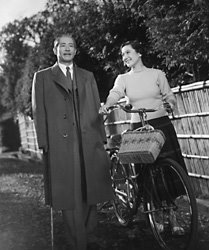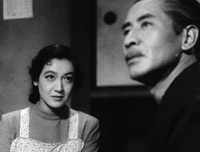
Sound of the Mountain (Yama No Oto, 1954)
Director: Mikio Naruse
When it comes to family dramas, no world cinema has produced more genuine geniuses than has Japan's. The Big Three directors who dominated the silent era and middle years of our very young film industry are Yasujiro Ozu, Kenji Mizoguchi, and Mikio Naruse, and all were masters of the domestic drama. Indeed, Ozu's Tokyo Story (1953) may be the greatest family drama of all time. Later Japanese directors, including Akira Kurosawa and Hayao Miyazaki, also have explored families in several innovative ways, such as Ran (1985), Kurosawa's version of the Shakespeare's royal domestic tragedy King Lear, and Miyazaki's anime instant classic Spirited Away (2001). Sound of the Mountain, based on a novel by Yasunari Kawabata, winner of the 1968 Nobel Prize for Literature, is a superb example of the genre the Japanese have claimed for their own.
The film focuses on the Ogata family of Tokyo. The patriach, Shingo (Sô Yamamura), lives with his plump and comfortable wife Yasuko (Teruko Nagaoka), son Shuichi (Ken Uehara) and daughter-in-law Kikuko (Setsuko Hara). Shuichi and Shingo are in business together, but rarely come home from the office together. Shuichi enjoys dance halls and has been embroiled in an affair for some time. The beautiful and modest Kikuko tends to her in-laws' every need, and while the domestic scene isn't blissful, it is in a balance of a sort. When the Ogata's daughter Fusako (Chieko Nakakita) returns to the fold with her two children in tow, vowing never to return to her cheating and feckless husband, Shuichi moves into action to reconcile the couple.
Fusako's return is a turning point for both Shingo and Kikuko, as it brings into focus the truth of their lives. Shingo sees how his passive approach to the lives of his children, whic
 h could seem to be a virtue in some eyes, is actually harmful to them both. Kikuko reacts strongly when Fusako complains to her father that he should have given her husband a more thorough going over before he married her off to him. Kikuko finally must admit how desperately unhappy she is, and she and Shingo both must have the courage to ensure her freedom. For, you see, they love each other very much.
h could seem to be a virtue in some eyes, is actually harmful to them both. Kikuko reacts strongly when Fusako complains to her father that he should have given her husband a more thorough going over before he married her off to him. Kikuko finally must admit how desperately unhappy she is, and she and Shingo both must have the courage to ensure her freedom. For, you see, they love each other very much.I don't mean to imply that there is a romantic love between them, though I'm sure that emotion may be a tiny part of the mix. In fact, it is a closeness that transcends father and daughter to include a deep friendship. Kikuko cares for and waits on Shingo at home, perhaps to substitute for the love she wishes she could lavish on a husband. Shingo, in turn, dotes on her. Tellingly, Yamamura and Hara also starred together in Tokyo Story; their chemistry is a rare and wonderful thing, putting their familial love at the very heart of this heartfelt movie.
It would be easy to dismiss Shuichi as the villian, since Uehara portrays him as a surly cad who treats his wife brusquely. But it becomes evident that somewhere along the line Kikuko rejected him. The couple is childless, though both tell others that each is keen to have children. Shuichi says, "Kikuko is a very fastidious woman. She doesn't want my child." The pain of that statement cut me like a knife. Secondary characters, such as Shuichi's mistress, are given room to tell their story. The disappointments of life, a characteristic sentiment of Naruse films, are revealed with economy, insight, and sympathy.
In the last scene, Kikuko and Shingo meet in a park. Shingo comments on how nice it is to have so much open space available inside Tokyo and marvels at the wide expanse of the lawn. He fumbles for a word to describe it. Kikuko helps out. "Vista," she says. "What does that mean?" asks Shingo. She replies, "Perspective. It makes the area look larger." This is the lesson Shingo and Kikuko both have learned to help them pursue happiness without each other. The vista Naruse has provided us with in Sound of the Mountain can't help but expand us within. This is a film to treasure. l


3 Comments:
At 9:11 PM, Anonymous said…
Anonymous said…
What a sensitive review of this delicate yet strong-as-steel film, Marilyn! All of Naruse’s people seem enmeshed in complex relationships where each move has subtle repercussions in others. The line that struck me particularly was Kikuyo’s surprising justification for her abortion: she didn’t want to use the baby to hold her husband. Tellingly, if I recall it correctly, Kikuyo doesn’t actually voice this, but another character reports it.
A whole further dimension is the responsibilities and inevitable disappointments of being a father and husband in an unstable moral world where kindness and cruelty can be flip sides of the same action. Everyone seems to remind the father of his various shortcomings or challenge the authenticity of his relationships: his wife, for example, says matter-of-factly, “If my beautiful sister hadn’t died, you’d have married her instead”. The finale is moving because, despite his best intentions, he owns up to complete failure in trying to help Kikuyo: “I couldn’t do anything for you. I became your handcuffs. All I can do for you now is to set you free”.
These great lines are presumably all in Kawabata’s novel as well, but every Naruse film depicts people in situations that force them to emotionally accept certain realities, sometimes for better, who knows if for worse?
--Bob Keser
At 9:23 PM, Marilyn said…
Marilyn said…
Bob, You have added some interesting observations of your own. Japan was in flux at the time this movie was made, moving toward a Westernized approach to life. I find the feminist sentiments in the movie very advanced--the mistress who intends to have her baby, divorcing its paternity from Shuichi and Kikuko, who prefers the loss of a child she very much wants in order to secure her freedom.
This is a tough-minded movie, one that takes men to task without villifying them completely. Life's disappointments enmesh us all. I think it is a great testament to Shingo's character that age has brought him wisdom and moved him to be an actor in his own life.
At 1:03 PM, Anonymous said…
Anonymous said…
Your blog is getting every day better. Congratulations.
Post a Comment
<< Home